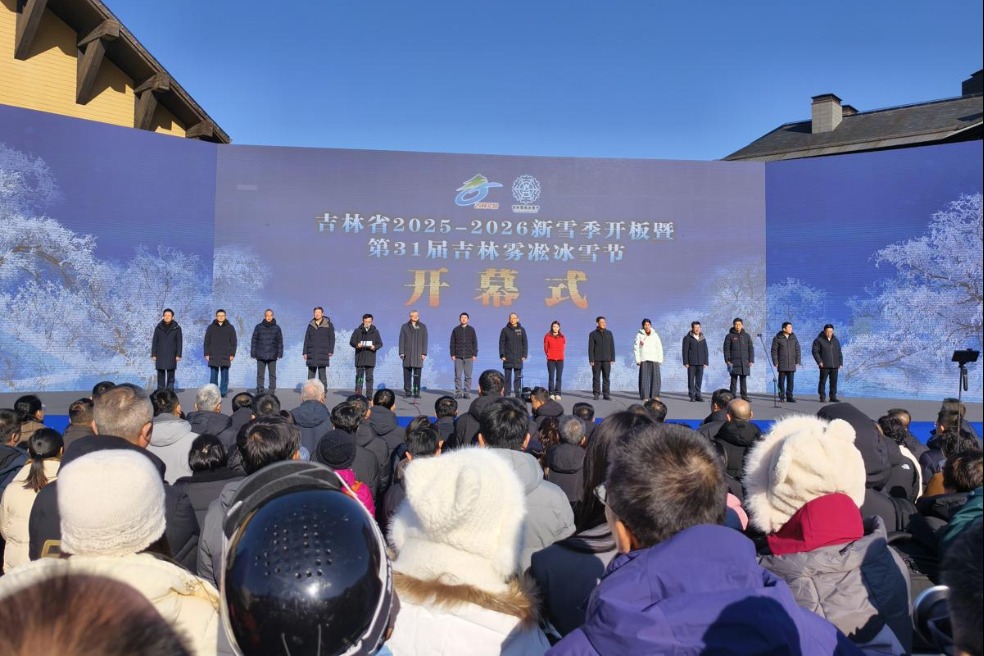China's model of governance widely praised
Planning, ambition and pragmatism given credit as drivers of transformation

On his first visit to Beijing in the early 1980s, Eberhard Sandschneider was struck by a sea of bicycles — a daily sight that would later become the exact picture in his mind when humming the melody of the song Nine Million Bicycles. The city moved at a relaxed pace then, its streets defined more by simplicity than speed.
Returning to the Chinese capital last week, Sandschneider, a professor emeritus at the Free University of Berlin, described the results of the transformation as almost unrecognizable.
"If you go out on the street today, you immediately see the difference. Modern buildings, advanced technology and millions of cars — that's a symbol of China's economic growth," he said.
"It's an unbelievable change, which I've had the honor and pleasure to watch throughout my professional lifetime," he said.
For Sandschneider, a frequent China visitor, skyscrapers and traffic tell only part of the story. Behind them lie significant improvements in people's lives and breakthroughs in artificial intelligence, robotics and quantum computing — evidence that China has achieved rapid modernization and "has become a technological leader in the world", he said.
Such sweeping change is no accident, the 70-year-old said.
To understand its drivers, he said one has to try to observe as much as possible what China is doing under the leadership of President Xi Jinping.
While many factors have fueled China's economic success, long-term planning and a governance model combining strategic five-year development plans with flexible adjustments remain among the key drivers, allowing policymakers to respond swiftly to emerging challenges, he said.
Over the decades, China has consistently demonstrated pragmatism, skillfully balancing ambitious goals with practical execution, Sandschneider said, adding that Europe "could learn from that pragmatic approach".
Many observers, like Sandschneider, believe that the way to understand the playbook of China's development is to understand the political ideas and governance philosophy behind it.
Pablo Iglesias Turrion, former Spanish deputy prime minister, said that China's steady transformation is closely linked to the governing philosophy reflected in Xi Jinping: The Governance of China — a widely regarded resource that he said has helped global audiences better understand China's policy logic and the ideas driving its modernization.
Since its first volume was published in 2014, the series has grown to five volumes and has been translated into more than 40 languages, reaching over 180 countries and regions. The fifth volume, available in both Chinese and English, was published in July.
Iglesias said he is still working his way through the books and has closely followed China's policy decisions, which, he is convinced, are reshaping global dynamics.
"In today's world, President Xi is undoubtedly a widely recognized global leader," he said, adding that China has become an indispensable force in promoting a more multipolar international order.
Xi has repeatedly emphasized that the scientific formulation and sustained implementation of five-year plans represent an important piece of governance experience for the Communist Party of China and a major political strength of socialism with Chinese characteristics.
Iglesias said these plans show how political leadership can coordinate development and ensure that economic gains reach a broad segment of society.
While no planning system is perfect, Iglesias argued that China's model has proved to be "stable and effective", particularly compared with what he described as the United States' tendency to prioritize the interests of the wealthy elite.
"China's five-year plans demonstrate political will through concrete policies that mobilize economic forces to serve the people," he said. "That is one of the most compelling aspects of the system."
Iglesias also emphasized that China's international engagement is not about exporting a political model or infringing on other countries' sovereignty. "China's development is good news for humanity," he said.
Former Czech deputy foreign minister Petr Drulak offered a similar view. He noted that in just one generation, China has undergone a profound transformation that reshaped both the economy and the life paths of its people — a shift he called "truly remarkable".
At a time when several major economies are turning inward, Drulak said he is particularly focused on how China intends to further expand its opening-up in the coming years, as the steps and ambitions for doing so have been written in the country's recommendations for the 15th Five-Year Plan (2026-30).
Grzegorz W. Kolodko, former deputy prime minister and finance minister of Poland, said that words like "impressive" hardly capture the scale of China's achievements. Even with a recent slowdown, he noted, China "is still growing at a pace twice — or even more than twice — that of the rich countries".
Kolodko has also examined China's engagement with the wider world. He notes that China's development model is attracting growing interest across the Global South, where many policymakers are carefully learning from China's experience.
"They are trying to learn as much as they can from China's positive experience," he said, adding that this trend "deserves careful analysis", because learning from others' successes is "always good advice".
zhaojia@chinadaily.com.cn
- Aquaculture reels in economic opportunities
- China's model of governance widely praised
- World Television Day celebrated with conference in Shanxi
- University launches new AI department to align with national priorities
- Jilin kicks off 2025-26 snow season with grand opening event
- China hails 'hard-won' COP30 Global Mutirao decision




































